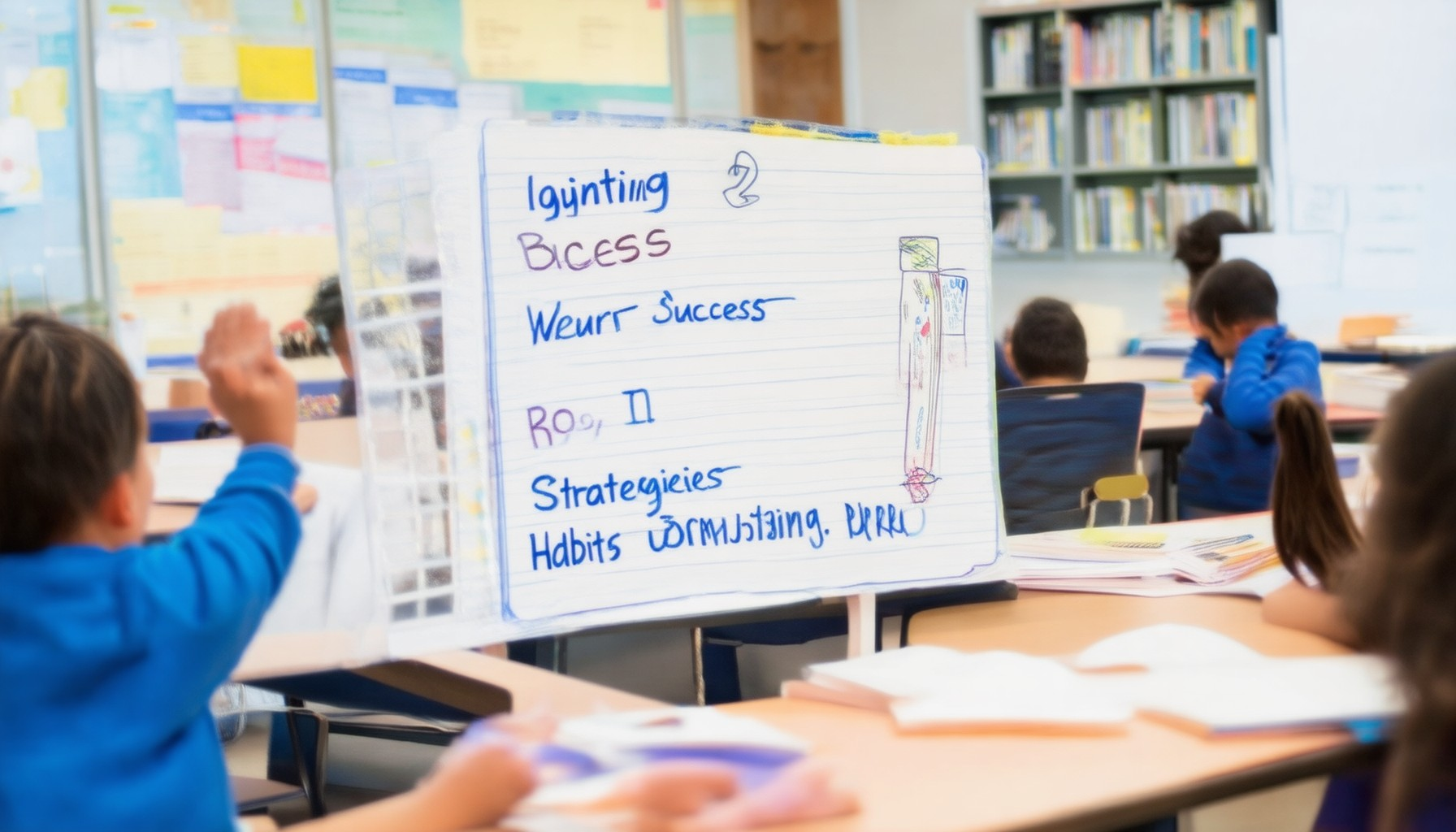Academic success is a cornerstone of future opportunities, shaping career trajectories and personal growth. Achieving it requires more than just innate talent; it demands a blend of consistent habits, strategic thinking, and proactive actions. Whether you’re a student navigating the complexities of higher education or a parent seeking to empower your child, understanding the keys to academic success is vital. This comprehensive guide delves into the essential habits, strategies, and actions that pave the way for triumph, offering practical advice that transcends mere study techniques. From mastering time management to fostering a growth mindset, we explore proven methods that inspire lasting change. By examining the habits of successful students and the strategies employed by those who excel, this article equips you with the tools needed to unlock your full potential. Prepare to discover how small, deliberate choices can lead to significant, long-term achievements, making academic success not just a goal but a reality.
Key Takeaways
- Curriculum Alignment ensures progression and prepares students for future challenges.
- Best Practice Teaching delivers effective, research-based instruction.
- Personalized Instruction adapts to individual learning needs.
- High Expectations foster a culture of excellence and ambition.
- Culturally Responsive Teaching creates an inclusive, diverse environment.
- Support Systems provide resources and a safe space for success.
- Community Involvement engages families and businesses for additional support.
- Technology Integration enhances learning with modern tools.
- Ongoing Assessment monitors progress and guides improvement.
- Growth Mindset believes abilities can be developed through effort.
- Comprehensive Curriculum offers a broad and deep education.
- Expert Faculty lead dynamic, enriching learning environments.
- Supportive Environment prioritizes safety, inclusivity, and accessibility.
- Hands-On Learning combines practical experiences with theory.
- Critical Thinking develops essential analytical skills.
- Global Perspectives prepare students for an interconnected world.
- Ethical Values instill integrity, respect, and compassion.
- Strong Instructional Leadership aligns teaching with student needs.
- Safe Environment promotes security and engagement.
- Focus on Basic Skills lays a strong academic foundation.
- Frequent Monitoring identifies strengths and areas for improvement.
How Do You Become Academically Successful?
To achieve academic success, it’s essential to adopt a strategic and proactive approach. Below are proven strategies that can guide you toward achieving your academic goals:
1. Set Clear, Achievable Goals
Start by defining what academic success means to you. Whether it’s earning good grades, excelling in extracurricular activities, or preparing for a successful career, having well-defined objectives will keep you focused and motivated.
2. Develop a Strong Academic Mindset
Academic success isn’t just about intelligence; it’s about mindset. Cultivate traits like resilience, curiosity, and a growth mindset. These qualities will help you navigate challenges and embrace opportunities for improvement.
3. Effective Time Management
Time management is a cornerstone of academic success. Prioritize tasks, create a study schedule, and allocate time for breaks. Tools like planners or digital calendars can help you stay organized and on track.
4. Seek Resources and Support
Utilize available resources, whether they’re textbooks, online platforms, or academic support centers. Don’t hesitate to ask for help from teachers, mentors, or peers when you’re struggling. Collaborative learning can also enhance your understanding.
5. Stay Motivated and Persistent
Academic success requires persistence. Stay motivated by remembering your long-term goals and celebrating small achievements along the way. Overcome setbacks with determination and adaptability.
6. Continuous Learning and Adaptation
The world is constantly evolving, so it’s crucial to stay updated with new knowledge and skills. Engage in lifelong learning through courses, workshops, or self-study to remain competitive and relevant in your field.
7. Build Strong Relationships
Nurturing relationships with professors, classmates, and mentors can open doors to opportunities and provide valuable feedback. Collaboration and networking can lead to mentorship and support, which are vital for academic and professional growth.
8. Practice Self-Care
Academic success isn’t possible without physical and mental well-being. Ensure you get enough sleep, eat healthily, and take regular breaks to maintain your energy and focus.
9. Leverage Technology
Use tools and resources wisely to enhance your learning process. From apps for time management to online databases, technology can significantly support your academic journey.
10. Reflect and Improve Regularly
Take time to reflect on your progress and identify areas for improvement. This self-assessment will help you make necessary adjustments and stay aligned with your academic goals.
By implementing these strategies, you can create a roadmap to academic success. Remember, consistency, dedication, and a positive attitude are key factors in achieving your aspirations.
What is the Secret of Student Success?
The secret to student success lies in a combination of effective strategies, discipline, and a growth mindset. Here are some proven techniques to help you excel:
- Effective Time Management: Prioritize tasks based on deadlines and importance. Use tools like planners or digital calendars to stay organized.
- Set Clear Goals: Define short-term and long-term objectives. Break them down into manageable steps to stay focused and motivated.
- Active Learning Strategies: Engage with material actively through discussions, debates, and applying concepts to real-world scenarios.
- Stay Organized: Create a structured study environment and develop a consistent routine to maximize productivity.
- Health and Well-being: Maintain a balanced lifestyle with adequate sleep, nutrition, and exercise to sustain energy and focus.
- Seek Help When Needed: Don’t hesitate to ask teachers, mentors, or peers for clarification or support when you’re struggling.
- Leverage Technology: Use apps and tools to track progress, manage tasks, and stay connected with classmates and resources.
- Build a Support Network: Surround yourself with motivated individuals who inspire and challenge you to succeed.
By implementing these strategies, you can unlock your full potential and achieve lasting academic success. Remember, consistency and perseverance are key to long-term achievements.
For more tips and resources, visit Enroll Maven’s learning strategies page and explore our guides on study organization .
What Are the Three Main Factors of Academic Success?
The foundation of academic success is built upon three primary components that work synergistically to drive achievement. Understanding and mastering these elements can significantly enhance your academic journey.
-
Time Management
Effective time management is the cornerstone of academic success. Students who can balance their responsibilities, allocate time wisely, and adhere to deadlines consistently perform better. By prioritizing tasks based on urgency and importance, students can optimize their productivity and reduce stress. Tools like planners or digital calendars can aid in organizing schedules effectively.
-
Study Habits
Developing strong study habits is essential for long-term academic success. Consistent study sessions, active engagement with material, and a quiet environment contribute to better retention and understanding. Techniques such as summarizing notes, teaching concepts to oneself, and practicing regularly can significantly boost learning outcomes.
-
Mindset and Motivation
A positive and growth-oriented mindset is critical for overcoming challenges and staying motivated during difficult times. Believing in one’s abilities, embracing feedback, and maintaining a proactive attitude foster resilience and drive. Surrounding oneself with supportive peers and seeking mentorship can further amplify academic achievements.
By focusing on these three pillars—time management, study habits, and mindset—you can create a robust framework for sustained academic success.
What Makes a Successful Education?
A successful education is characterized by a combination of key elements that work together to create an effective and enriching learning environment. These elements include curriculum alignment, teacher effectiveness, personalized instruction, high expectations, culturally responsive teaching, support systems, community engagement, technology integration, and ongoing assessment. Here’s a breakdown of each:
- Curriculum Alignment : Ensures that the content taught aligns with state standards and builds progressively from one grade to the next, preparing students for future challenges.
- Best Practice Teaching : Utilizes research-based methods and stays updated with pedagogical advancements to deliver instruction effectively.
- Personalized Instruction : Adapts teaching strategies to meet individual student needs, ensuring that each learner receives the support necessary for success.
- High Expectations : Sets ambitious goals for students, fostering a culture of excellence and encouraging academic rigor.
- Culturally Responsive Teaching : Incorporates diverse perspectives into the curriculum, creating an inclusive environment that values differences and promotes empathy.
- Support Systems : Provides access to resources like tutoring, mentorship, and extracurricular activities, along with safe and supportive environments, to help students thrive.
- Community Involvement : Engages families and local businesses to create additional learning opportunities and support networks for students.
- Technology Integration : Uses modern tools and digital resources to enhance learning experiences and prepare students for a tech-driven world.
- Ongoing Assessment : Continuously monitors student progress through regular evaluations and provides constructive feedback to guide improvement.
- Growth Mindset : Cultivates an environment where both educators and students believe that abilities can be developed through dedication and hard work.
By integrating these elements, an education system can foster an environment where students not only achieve academic success but also develop essential life skills and a love for lifelong learning.
What Makes an Ideal Education?
An ideal education is a comprehensive and enriching experience that equips individuals with the knowledge, skills, and values needed for personal and professional growth. Below are the key components that define an optimal educational framework:
- Relevant and Comprehensive Curriculum
A high-quality education begins with a curriculum that is both broad and deep, covering essential subjects while also allowing for exploration of specialized areas. It should adapt to evolving fields and individual interests, ensuring students gain a well-rounded understanding of the world. - Expert Faculty
The foundation of a great education lies in the expertise of teachers. Professors and mentors who are leaders in their fields bring real-world experience and insights, fostering a dynamic learning environment. - Supportive Learning Environment
Education thrives in environments that prioritize safety, inclusivity, and accessibility. A nurturing atmosphere where students feel valued and supported helps them thrive academically and emotionally. - Hands-On Learning Opportunities
Practical experiences, such as laboratory work, internships, and project-based learning, complement theoretical knowledge, helping students apply concepts in real-world contexts. - Development of Critical Thinking
An ideal education cultivates analytical thinking and problem-solving abilities. Students should learn to evaluate information critically, a skill essential for success in any career. - Global and Multicultural Perspectives
Exposure to diverse cultures and global issues prepares students to navigate an increasingly interconnected world, fostering empathy and understanding. - Personalized Instruction
Tailored teaching methods cater to individual learning styles and needs, ensuring every student receives the support necessary to succeed. - Integration of Ethical Values
A holistic education includes character development, instilling integrity, respect, and compassion, which are vital for personal and societal well-being.
By combining these elements, an ideal education empowers individuals to become lifelong learners and contributors to society.
The Five Factor Theory of Effective Schools
The 5-factor theory of effective schools identifies key characteristics that contribute to academic success and positive school culture. These factors, often referred to as the “Five Keys,” provide a framework for understanding what makes a school thrive. Below is a breakdown of each component:
- High Expectations
- Schools that set high academic and behavioral standards tend to see better outcomes.
- Clear goals and aspirations create a motivating environment for students and staff.
- Consistent messaging about the importance of education fosters a culture of excellence.
- Strong Instructional Leadership
- Effective school leadership is crucial for aligning teaching practices with student needs.
- Principals and leaders who are visible, supportive, and knowledgeable drive academic performance.
- Professional development opportunities for teachers ensure they are equipped to meet challenges.
- Safe and Orderly Environment
- A physically and emotionally secure environment is essential for learning.
- Schools that prioritize safety and discipline report fewer behavioral issues and higher engagement.
- Positive relationships between students and staff promote a welcoming atmosphere.
- Focus on Basic Skills
- Emphasizing core subjects like reading, math, and science lays a strong foundation.
- Extracurricular activities and enrichment programs complement academic development.
- A balanced approach ensures students master fundamental skills before progressing to advanced topics.
- Frequent Monitoring and Support
- Regular assessments allow schools to identify strengths and areas needing improvement.
- Individualized attention to student needs helps address gaps in learning early.
- Collaborative efforts between teachers, parents, and support staff ensure holistic development.
By focusing on these five factors, schools can create an environment that supports student success, fosters positive relationships, and achieves long-term academic goals.









0 Comments